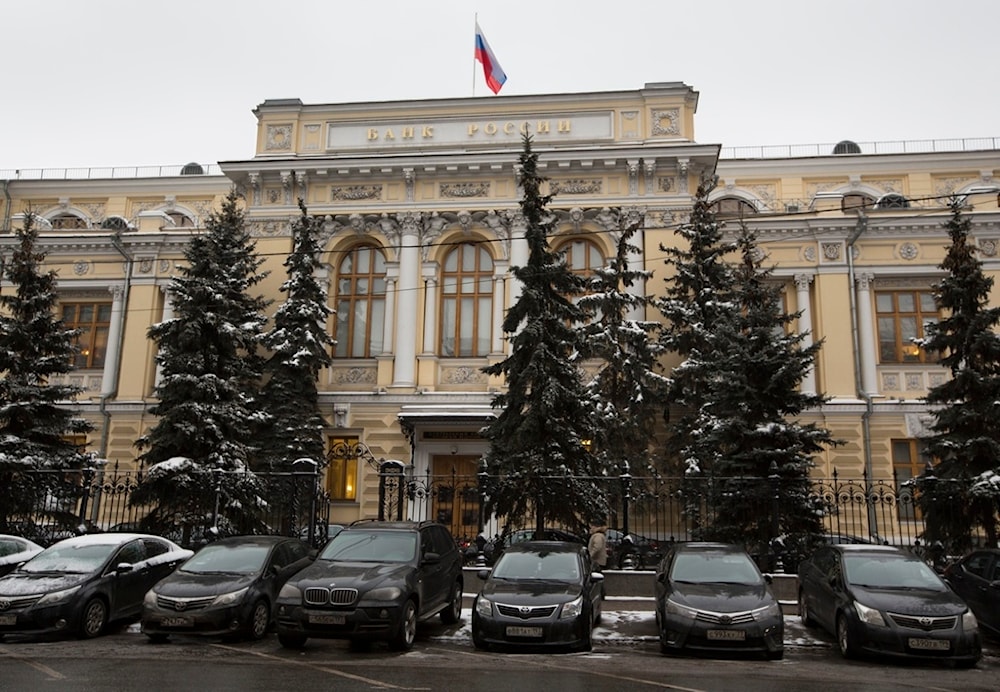IMF warns of risks from Western seizure of Russian assets
This development comes a day after a team of legal experts deemed that the confiscation of Russian assets is permissible under international law, citing Russia's ongoing special military operation in Ukraine.
-

Cars are parked in front of Russia's Central Bank building in Moscow, Russia, Friday, Jan. 30, 2015. (AP)
The International Monetary Fund (IMF) cautioned on Thursday that Western plans to seize frozen Russian assets could pose a threat to the global monetary system and entail unforeseen risks.
"From our perspective, it is important that any actions have sufficient legal underpinnings to avoid potential risks, and these include risks of litigation, risks of countermeasures, and risks to the international monetary system," IMF spokesperson Julie Kozack told reporters.
This development comes a day after a team of legal experts deemed that the confiscation of Russian assets is permissible under international law, citing Russia's ongoing special military operation in Ukraine.
Approximately $300 billion in securities and cash have been frozen by the EU, G7 nations, and Australia, with the majority held in the EU.
While there was a belief that these funds should remain inaccessible to Russia unless it assists in Ukraine's reconstruction, there was disagreement over the legality of outright asset seizure.
They therefore sought guidance from a team of ten international law experts and practitioners, who unanimously affirmed in a joint letter that the seizure of assets is entirely legal.
"We have concluded that it would be lawful, under international law, for States which have frozen Russian State assets to take additional countermeasures against Russia, given its ongoing breach of the most fundamental rules of international law, in the form of transfers of Russian State assets as compensation for the damage that has resulted directly from Russia’s unlawful conduct," the experts in the letter, which was obtained by Bloomberg.
Read more: EU confirms 13th package of anti-Russian sanctions
Russia has previously stated that such measures constitute "economic racketeering," noting that the seizure and transfer of Russian funds to Ukraine would be considered a breach of international law.
"[The EU’s] invention of openly fraudulent schemes for the seizure of income from Russian assets is dictated by the need to create the illusion of legitimacy over attacks on our property and thereby camouflage what is in fact an outright theft," the Russian Foreign Ministry said on February 10.
It added that EU members "clearly do not want to continue paying for the doomed 'Ukrainian project' from their own wallets," which is "why they are so tempted by the idea of spending funds stolen from our country to support the Zelensky regime."
A new financial market in the making
The ongoing war in Ukraine has spurred debates about de-dollarization in recent years. Mainstream narratives normally highlight the depth and safety of the US financial market, suggesting that the dollar is unquestionably irreplaceable.
But the resilience of Russia's economy and efforts to mitigate US sanctions have challenge this notion.
Despite encountering sanctions, the value of the Russian ruble has remained relatively stable, effectively showing the limitations of measuring economic worth solely in dollar terms. Moreover, Russia's development of alternative payment systems such as the Mir system and its alliance with China further undermine the dollar's dominance.
Moreover, efforts to de-dollarize the global economy had already been gaining traction far before the war in Ukraine erupted. They became particularly evident when the BRICS expanded to include some of the US's most crucial allies, including Saudi Arabia, which played a pivotal role in the creation of the petrodollar system.
Read more: Russia launches first market trial of state-backed digital ruble
De-dollarization picks up speed
The concept of breaking the petrodollar system has gained attention, particularly as China and other nations seek alternatives to the US dollar for trading oil. Initiatives such as China's diplomatic efforts in Saudi Arabia and its acquisition of gold reserves signify steps toward disrupting the dominance of the petrodollar.
While gold serves as a partial hedge against economic instability, it alone cannot challenge the depth and confidence of the US financial market.
Real de-dollarization requires a geopolitical shift and erosion of consensus around the dollar, which may be accelerated by events like the war in Ukraine and Europe's weakening position.
However, transitioning away from the dollar presents significant challenges, given the fragile global financial system.
Despite these challenges, some observers maintain that de-dollarization is essential for reducing financial dependency and the exploitation of resources for the benefit of a few.

 4 Min Read
4 Min Read








